시 한편
서정가요집 (Lyrical Ballads) – 윌리엄 워즈워스와 새뮤얼 테일러 콜리지의 시 모음집 (1798)
서정가요집 (Lyrical Ballads)은 윌리엄 워즈워스와 새뮤얼 테일러 콜리지의 시 모음집으로 1798년 출간되었으며, 문학에서 영국 〈낭만주의 운동〉의 효시로 여겨지고 있다.
비평가들의 즉각적인 영향은 절제되었지만, 그것은 여전히 영국 문학과 시의 길을 바꾼 이정표로 남아있다.
1798년 판의 시들은 대부분 워즈워드에 의해 쓰여졌으며, 코울리지는 모음집에 단지 4편의 시만 싣고 있다.
그 중에는 《늙은 선원의 노래》 (The Rime of the Ancient Mariner)도 들어있다.
두 번째 판은 1800년에 출간되었으며, 거기에서 워즈워드는 추가적인 시와 서문을 싣고 있다.
그 서문에서 워즈워드는 그의 시작법의 원리를 자세히 설명하고 있다.
다른 판은 1802년에 출간되었는데, 워즈워드는 서문에서 시작하였던 이상을 확장한 《시 표현법》 (Poetic Diction)이라는 부록을 싣고 있다.
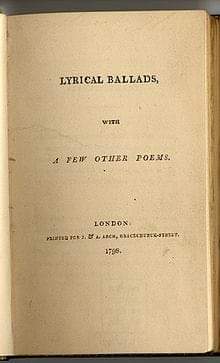
- 내용
워즈워드와 코울리지는 그들이 배워왔던, 그리고 대단히 틀에 박힌 형태의 영국 시의 형태에 대해서, 그들이 아니라고 생각했던 것들에 대해서 타도를 시작했다.
그리고 보통사람들이 쉽게 알아들을 수 있는 평이하고, 일상적인 언어에서 가져온 운율을 사용하여 시를 쓰기 시작했다.
그들은 가난한 사람들이 현실을 표현한 살아있는 목소리의 생생함에 역점을 두었다.
이러한 언어를 사용하는 것은 또한 인간 감정의 보편성을 주장하는 데에도 도움이 되었다.
고대 농촌의 서정시인과 연결시키는 〈서정적〉(lyrical)이라는 시의 제목조차도 전원생활의 예술적 형태를 연상시켜서 동시성을 빌려오게 된다.
반면 〈가요〉(ballads)라는 말은 보통 사람들이 말하는 이야기를 해주는 (storytelling) 구어적 형식이다.
그의 유명한 《서문》(Preface, 1800년, 1802년 개정)에서 워즈워드는 그의 시적 개념을 다음과 같이 설명한다.
“다음 시들의 대부분은 실험적으로 생각될 것이다. 그러한 시들은 사회 중하층민들의 대화 언어가 시적 즐거움을 위해 얼마나 개작될 수 있는 지를 확신시킨다는 관점에서 쓰여졌다.”
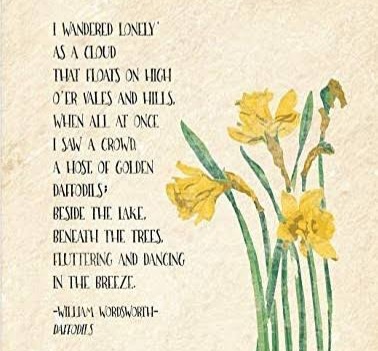
○ Daffodils (수선화) _ William Wordsworth
I wandered lonely as a cloud
That floats on high o’er vales and hills,
When all at once I saw a crowd,
A host, of golden daffodils;
Beside the lake, beneath the trees,
Fluttering and dancing in the breeze.
산골짜기와 언덕 위 높은 하늘에 떠도는
구름처럼 외로이 헤매다가
문득 나는 보았네,
한 무리 모여 있는 황금 수선화.
호숫가 옆, 수목들 아래로
미풍에 나부끼며 춤을 추었네.
Continuous as the stars that shine
And twinkle on the milky way,
They stretched in never-ending line
Along the margin of a bay:
Ten thousand saw I at a glance,
Tossing their heads in sprightly dance.
은하수에서 반짝이며
비치는 별들처럼
물가 따라 끝없이
줄지어 뻗쳐 있는 수선화
나는 한눈에 보았네, 천만 송이 꽃들을
머리를 흔들면서 춤을 추었소.
The waves beside them danced, but they
Out-did the sparkling waves in glee:
A poet could not be but gay,
In such a jocund company:
I gazed-and gazed-but little thought
What wealth the show to me had brought:
수선화 주위의 물결도 춤을 추었지만
그 반짝이는 물결은 수선화의 기쁨을 따를 수 없었네,
어찌 시인이 즐겁지 않으리
이토록 흥겨운 무리 속에서.
나는 하염없이 바라보고 또 보았지만
이러한 장관이 어떤 보배를 가져다주었는지 알지 못했네.
For oft, when on my couch I lie
In vacant or in pensive mood,
They flash upon that inward eye
Which is the bliss of solitude;
And then my heart with pleasure fills,
And dances with the daffodils.
이따금, 내 침상에 누었을 때
멍하니 아니면 사색에 잠기어
고독의 축복인 내 마음의 눈에
홀연 번뜩이는 수선화.
그럴 때면 내 마음은 기쁨에 넘쳐
수선화와 함께 춤을 추노라.
○ The Rime of the Ancient Mariner (늙은 선원의 노래) _ Samuel Taylor Coleridge

The Rime of the Ancient Mariner
PART I
An ancient Mariner meeteth three Gallants bidden to a wedding-feast,
and detaineth one.
It is an ancient Mariner,
And he stoppeth one of three.
“By thy long beard and glittering eye,
Now wherefore stopp’st thou me ?
The Bridegroom’s doors are opened wide,
And I am next of kin ;
The guests are met, the feast is set :
May’st hear the merry din.“
He holds him with his skinny hand,
“There was a ship,” quoth he.
“Hold off ! unhand me, grey-beard loon !”
Eftsoons his hand dropt he.
The Wedding-Guest is spell-bound by the eye of the old seafaring man,
and constrained to hear his tale.
He holds him with his glittering eye–
The Wedding-Guest stood still,
And listens like a three years’ child :
The Mariner hath his will.
The Wedding-Guest sat on a stone :
He cannot choose but hear ;
And thus spake on that ancient man,
The bright-eyed Mariner.
“The ship was cheered, the harbour cleared,
Merrily did we drop
Below the kirk, below the hill,
Below the lighthouse top.
The Mariner tells how the ship sailed southward with a good wind and fair weather, till it reached the Line.
The Sun came up upon the left,
Out of the sea came he !
And he shone bright, and on the right
Went down into the sea.
Higher and higher every day,
Till over the mast at noon–“
The Wedding-Guest here beat his breast,
For he heard the loud bassoon.
The Wedding-Guest heareth the bridal music ; but the Mariner continueth his tale.
The bride hath paced into the hall,
Red as a rose is she ;
Nodding their heads before her goes
The merry minstrelsy.
The Wedding-Guest he beat his breast,
Yet he cannot choose but hear ;
And thus spake on that ancient man,
The bright-eyed Mariner.
The ship driven by a storm toward the south pole.
`And now the STORM-BLAST came, and he
Was tyrannous and strong ;
He struck with his o’ertaking wings,
And chased us south along.
With sloping masts and dipping prow,
As who pursued with yell and blow
Still treads the shadow of his foe,
And forward bends his head,
The ship drove fast, loud roared the blast,
The southward aye we fled.
And now there came both mist and snow,
And it grew wondrous cold :
And ice, mast-high, came floating by,
As green as emerald.
The land of ice, and of fearful sounds where no living thing was to be seen.
And through the drifts the snowy clifts
Did send a dismal sheen :
Nor shapes of men nor beasts we ken–
The ice was all between.
The ice was here, the ice was there,
The ice was all around :
It cracked and growled, and roared and howled,
Like noises in a swound !
Till a great sea-bird, called the Albatross, came through the snow-fog,
and was received with great joy and hospitality.
At length did cross an Albatross,
Thorough the fog it came ;
As if it had been a Christian soul,
We hailed it in God’s name.
It ate the food it ne’er had eat,
And round and round it flew.
The ice did split with a thunder-fit ;
The helmsman steered us through !
And lo ! the Albatross proveth a bird of good omen, and followeth the ship as it returned northward through fog and floating ice.
And a good south wind sprung up behind ;
The Albatross did follow,
And every day, for food or play,
Came to the mariner’s hollo !
In mist or cloud, on mast or shroud,
It perched for vespers nine ;
Whiles all the night, through fog-smoke white,
Glimmered the white Moon-shine.“
The ancient Mariner inhospitably killeth the pious bird of good omen.
“God save thee, ancient Mariner !
From the fiends, that plague thee thus !
–Why look’st thou so ?“–With my crossbow
I shot the ALBATROSS.
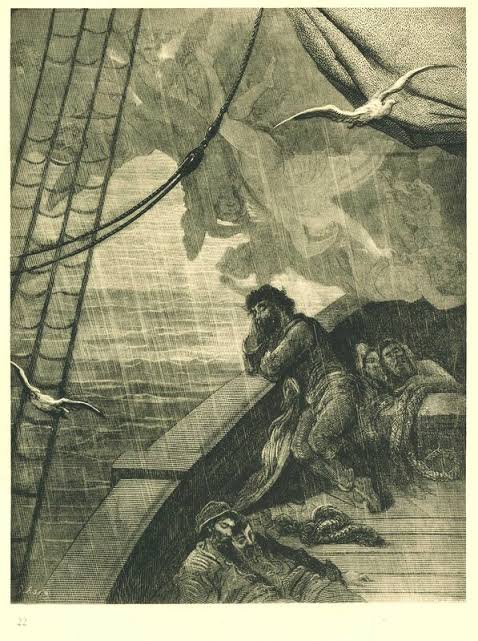
▷ 해석
늙은 선원의 노래
제 1부
한 늙은 선원이 결혼식에 초대받은 세 젊은이를 만나, 그 중 한 명을 불러세운다.
늙은 선원이
세 명 중 한 명을 불러세운다.
–“긴 수염이 반백인 노인이
무엇 때문에 나를 부르는가?
식장의 문이 활짝 열려있고
나는 가까운 친척이라오.
손님들이 와 있고, 잔치도 준비되었소.
즐겁게 떠드는 소리를 들어보시오.“
선원은 앙상한 손으로 그를 잡는다.
“배가 있었다네.” 그는 말했다.
“저리가! 이 손 놓지 못해, 이 부랑자!”
즉시 그는 손을 놓는다.
결혼식 하객은 늙은 선원의 눈에 마법이 걸려, 할 수 없이 그의 이야기를 듣게 된다.
건원은 반짝이는 눈으로 그를 붙들고
결혼식 하객은 가만히 서있다.
그리고 세살박이 어린아이처럼 듣는다.
선원은 그의 뜻대로 했다.
결혼식 하객은 돌 위에 앉았다.
그는 듣는 수밖에 없다.
그리고 그 늙은 선원,
눈매가 시원한 선원은 이렇게 말한다.
“배는 환호를 받으며 항구를 떠나
우리는 즐겁게 바다로 나갔다네.
교회와 언덕을 바라보며,
등대를 바라보면서…
선원은 맑은 날씨에 순풍을 타고 배가 적도에 다다른 경위를 말한다.
해가 왼쪽에서 떠올랐지.
마치 바다에서 솟아오르는 것처럼.
해는 맑게 빛났고 오른쪽으로,
바다 속으로 졌어.
날마다 높이, 더 높이 (뜬 태양은)
정오에는 돛대 너머로 올라갔지.“
결혼식 하객은 잔치에 참석을 못해서 안타까워했다.
그가 큰 바순 소리를 들었기 때문에
결혼식 하객은 결혼식 음악을 듣지만, 선원은 이야기를 계속한다.
신부는 홀에 들어섰고,
그녀의 얼굴은 장미처럼 붉었다.
사람들은 그녀의 앞에서
음악에 맞춰 고개를 끄덕였다.
결혼식 하객은 (안타까워) 가슴을 두드리지만
그는 계속 들을 수밖에 없다.
그리고 노인은,
눈매가 시원한 선원은 이렇게 말한다.
폭풍 때문에 배가 남극으로 간다.
“그런데 폭풍이 왔어.
아주 크고 강한 폭풍이…
폭풍은 뒤따라오는 날개를 쳤고
우리를 남쪽으로 데려갔지.
돛대는 기울고 뱃머리는 물에 잠긴 채,
마치 적으로부터 벗어나지 못하고
추격당하는 사람처럼
머리를 숙인 채로,
배는 빠르게 돌진했고, 돌풍이 불어와
우리는 계속해서 남쪽으로 흘러갔어.
그런 다음에는 안개와 눈이 내려와
끔찍하게 추워졌다네.
그리고 에메랄드처럼 푸른, 돛대높이의
얼음덩어리가 떠 왔어.
거대한 얼음과 무서운 소리로 어떠한 생물도 보이지 않았다.
안개와 눈의 흐름 때문에
빙산은 음울한 빛을 발하고
인간의 형상인지 짐승인지조차 분간할 수 없을 정도로
얼음이 도처에 있었어.
얼음은 여기도, 저기도
곳곳에 널려있었어.
그것은 탁탁 소리를 내며 시끄럽게 신음했지.
마치 기절하는 소리처럼.
알바트로스라 불리는 거대한 바대 새가 안개를 뚫고 날아와 대단한 환영을 받았다.
어느샌가 알바트로스가
안개속을 날아왔고
그것이 예수의 분신이라도 되는 듯
우리는 신의 이름으로 그를 환영했지.
그것은 먹이를 먹고는
원을 그리며 맴돌았어.
얼음이 시끄러운 소리를 내며 쪼개졌고
조타수가 키를 잡고 우리를 이끌었다네.
길조의 새인 알바트로스는 안개와 얼음 속에서 북으로 돌아가는 배를 따라온다.
마침 뒤에서 남풍이 불어왔고
알바트로스는 우리를 따라왔지.
그리고 매일, 먹이를 위해, 유희를 위해
선원들의 고함소리에 날아왔어.
안개와 구름 속에서, 돛대나 돛대밧줄위에
그것은 9일 저녁동안 앉아있었고
밤새도록, 여명이 밝아올 때까지
달빛을 받아 희게 빛났지.“
늙은 선원은 잔인하게도 길조의 새인 알바트로스를 죽인다.
“주여, 저를 이 늙은 선원을 용서하소서!
악령 때문에, 마귀에 씌여서
–“안색이 나쁘신데 왜 그러십니까?”–
제가 석궁으로 알바트로스를 쏘았습니다.“
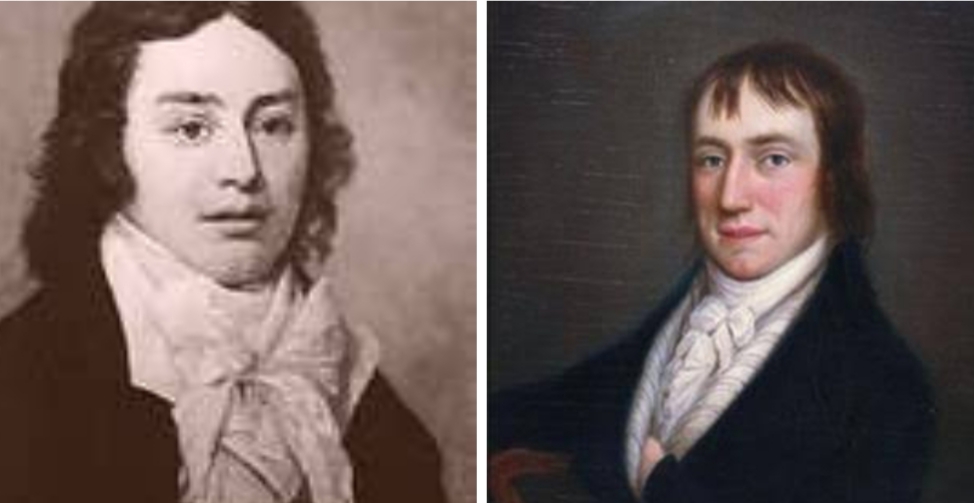
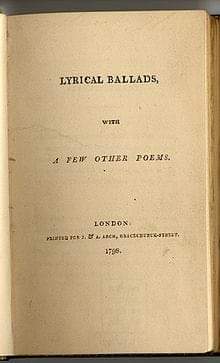
참고 = 위키백과
크리스천라이프 편집부
